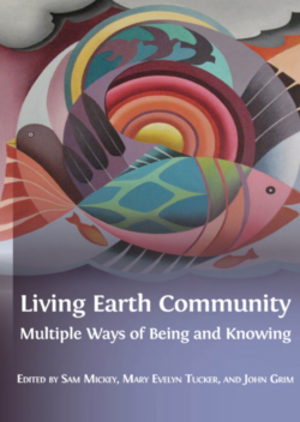Living Earth Community:
Multiple Ways of Being and Knowing
A collection of the “Living Earth Community” conference papers
Edited by Sam Mickey, Mary Evelyn Tucker, and John Grim; Open Book Publishers, 2020
Read this online open source book for free here.
See interviews with authors below.
Press Release
Flyer
Testimonials
Official Page at Open Book Publishers (buy a printed copy or download for free)
Living Earth Community Conference Page
Living Earth Community: Multiple Ways of Being and Knowing is a celebration of the diversity of ways in which humans can relate to the world around them, and an invitation to its readers to partake in planetary coexistence. Innovative, informative, and highly accessible, this interdisciplinary anthology of essays brings together scholars, writers and educators across the sciences and humanities, in a collaborative effort to illuminate the different ways of being in the world and the different kinds of knowledge they entail – from the ecological knowledge of Indigenous communities, to the scientific knowledge of a biologist and the embodied knowledge communicated through storytelling.
Living Earth Community: Multiple Ways of Being and Knowing synthesizes insights from across a range of academic fields, and highlights the potential for synergy between disciplinary approaches and inquiries. This anthology is essential reading not only for researchers and students, but for anyone interested in the ways in which humans interact with the community of life on Earth, especially during this current period of environmental emergency.
“That is why I believe I must tell stories as if the world were a living, single entity, constantly forming before our eyes, and as if we were a small and at the same time powerful part of it.”
~ Olga Tokarczuk, Nobel Lecture, December 7, 2019
Interview Videos of Contributors with Mary Evelyn Tucker
Each Monday and Wednesday during May 11 - July 6, 2020,
Open Book Publishers released interview videos featuring contributors to the volume.
View the Bios of Conference Participants.
Episode 1: Interview with Sam Mickey (editor)
Episode 2: Interview with John Grim (editor and author)
“Sensing, Minding, Creating”
Episode 3: Interview with David Abram
“Creaturely Migrations on a Breathing Planet: Some Reflections”
Episode 4: Interview with Julianne Warren
“Hopes Echo: Learning A Dead Birdsong”
Episode 5: Interview with Paul Waldau
“Humilities, Animalities and Self-Actualizations
in a Living Earth Community”
Episode 6: Interview with Eduardo Kohn
“Forest for the Trees: Spirit, psychedelic science,
and the politics of ecologizing thought as a planetary ethics”
Episode 7: Interview with Frédérique Marglin
“Reanimating the World through Dying to our Egos:
Amazonian Shamanism”
Episode 8: Interview with David Haskell
“Contemplative Studies of the 'Natural' World”
Episode 9: Timothy Brown
“Science, Storytelling, and Students:
National Geographic's On Campus Initiative”
Episode 10: Willis Jenkins
“Listening for Coastal Futures: The Conservatory Project”
Episode 11: Brooke Williams
“Imaginal Ecology”
Episode 12: Jeannette Armstrong
“An Okanogan Worldview of Society”
Episode 13: Mark Turin
“Rising Voices: Indigenous Language Resurgence
as Organic Interconnectivity”
Episode 14: Sean Kelly
“Gaia and a Second Axial Age”
Episode 15: Heather Eaton
“The Human Quest to Live in a Cosmos”
Episode 16: Mitchell Thomashow
“The Five Qualities” and “Biosphere Network Archetypes”
Episode 17: Peter Crane


